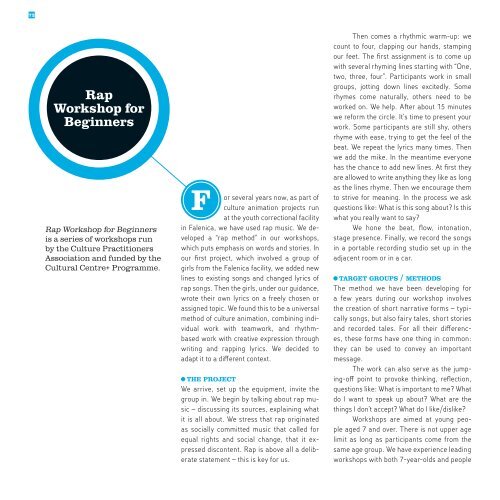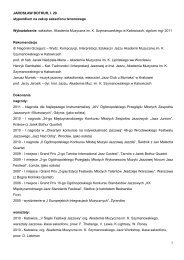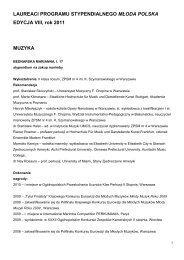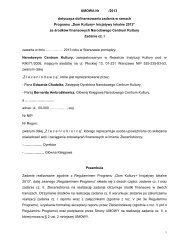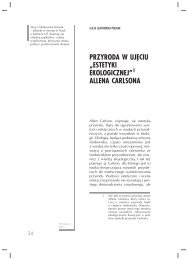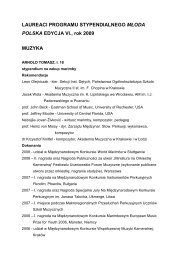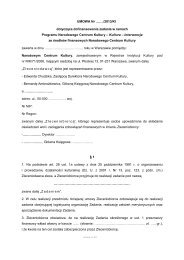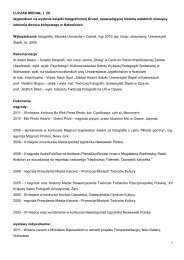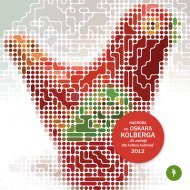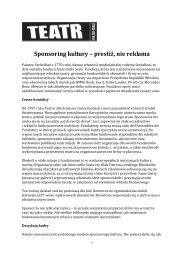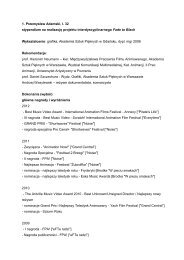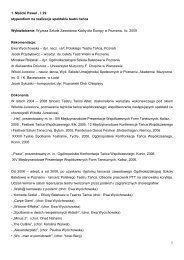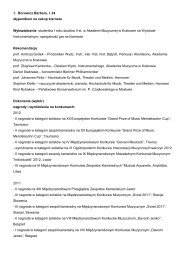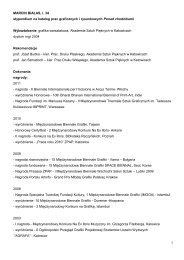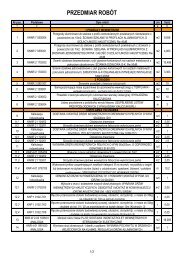Untitled - Narodowe Centrum Kultury
Untitled - Narodowe Centrum Kultury
Untitled - Narodowe Centrum Kultury
You also want an ePaper? Increase the reach of your titles
YUMPU automatically turns print PDFs into web optimized ePapers that Google loves.
72<br />
Rap<br />
Workshop for<br />
Beginners<br />
Rap Workshop for Beginners<br />
is a series of workshops run<br />
by the Culture Practitioners<br />
Association and funded by the<br />
Cultural Centre+ Programme.<br />
f<br />
or several years now, as part of<br />
culture animation projects run<br />
at the youth correctional facility<br />
in Falenica, we have used rap music. We developed<br />
a “rap method” in our workshops,<br />
which puts emphasis on words and stories. In<br />
our first project, which involved a group of<br />
girls from the Falenica facility, we added new<br />
lines to existing songs and changed lyrics of<br />
rap songs. Then the girls, under our guidance,<br />
wrote their own lyrics on a freely chosen or<br />
assigned topic. We found this to be a universal<br />
method of culture animation, combining individual<br />
work with teamwork, and rhythmbased<br />
work with creative expression through<br />
writing and rapping lyrics. We decided to<br />
adapt it to a different context.<br />
the project<br />
We arrive, set up the equipment, invite the<br />
group in. We begin by talking about rap music<br />
– discussing its sources, explaining what<br />
it is all about. We stress that rap originated<br />
as socially committed music that called for<br />
equal rights and social change, that it expressed<br />
discontent. Rap is above all a deliberate<br />
statement – this is key for us.<br />
Then comes a rhythmic warm-up: we<br />
count to four, clapping our hands, stamping<br />
our feet. The first assignment is to come up<br />
with several rhyming lines starting with “One,<br />
two, three, four”. Participants work in small<br />
groups, jotting down lines excitedly. Some<br />
rhymes come naturally, others need to be<br />
worked on. We help. After about 15 minutes<br />
we reform the circle. It’s time to present your<br />
work. Some participants are still shy, others<br />
rhyme with ease, trying to get the feel of the<br />
beat. We repeat the lyrics many times. Then<br />
we add the mike. In the meantime everyone<br />
has the chance to add new lines. At first they<br />
are allowed to write anything they like as long<br />
as the lines rhyme. Then we encourage them<br />
to strive for meaning. In the process we ask<br />
questions like: What is this song about Is this<br />
what you really want to say<br />
We hone the beat, flow, intonation,<br />
stage presence. Finally, we record the songs<br />
in a portable recording studio set up in the<br />
adjacent room or in a car.<br />
target groups / methods<br />
The method we have been developing for<br />
a few years during our workshop involves<br />
the creation of short narrative forms – typically<br />
songs, but also fairy tales, short stories<br />
and recorded tales. For all their differences,<br />
these forms have one thing in common:<br />
they can be used to convey an important<br />
message.<br />
The work can also serve as the jumping-off<br />
point to provoke thinking, reflection,<br />
questions like: What is important to me What<br />
do I want to speak up about What are the<br />
things I don’t accept What do I like/dislike<br />
Workshops are aimed at young people<br />
aged 7 and over. There is not upper age<br />
limit as long as participants come from the<br />
same age group. We have experience leading<br />
workshops with both 7-year-olds and people


